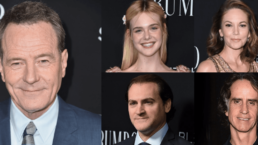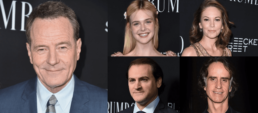Bryan Cranston, Elle Fanning, Diane Lane, Michael Stahlbarg & Jay Roach on ‘Trumbo’
"The challenge of working in the bathtub was not to get pruney fingers, and not to drink too much before getting into the bathtub." -Bryan Cranston
[soundcloud url=”https://api.soundcloud.com/tracks/231636538″ params=”color=ff5500&auto_play=false&hide_related=false&show_comments=true&show_user=true&show_reposts=false” width=”100%” height=”166″ iframe=”true” /]
Bryan Cranston, Diane Lane, Elle Fanning, Michael Stuhlbarg, and director Jay Roach take their seats at the rectangular table to begin our press conference at The Four Seasons Hotel. Immediately, I’m drawn to each and every one of them- all laughing and in genuine good spirits. For those who are familiar with her work, what I’m about to say is obvious: Elle Fanning is one of the sweetest and most down-to-earth young actresses I’ve ever spoken to. Her effervescent personality shines from the very beginning of the interview, as she is genuinely surprised to be asked the first question. Not to be upstaged was the man himself, Mr. Bryan Cranston, who joked around with Elle, exclaiming “What the Elle?” when she was asked the first question, and he was not. This little snippet into the relationship of the cast only further proves that they have truly something special, it’s not just “movie magic”. Cranston talks about getting into the character of Dalton, incessant smoking included, while Fanning talks about her favorite costumes as Dalton’s daughter, Nikola Trumbo. From Roach’s interest in the Hollywood Ten to Stuhlbarg and Lane’s initial script impressions, our interview highlights the individual connections each of them made to the film, and it is nothing short of inspiring. We begin:
Elle, were you aware of the “Hollywood Ten”?
Elle Fanning: Before reading this script, I wasn’t aware that the Blacklist or the “Hollywood Ten” existed, so it was shocking to learn that part of history. After I read it I asked my parents about it and they were like yeah, that actually happened. Getting to play Nikki Trumbo was really special and I hope I did her justice in that way.
Dalton Trumbo has very distinct characteristics, can you talk about getting into character, specifically the voice?
Bryan Cranston: There is a double entendre to that: the “voice” of Trumbo. There is a lot of source material, video, and audio tapes, on him, but you can get lost in that. If you only focus on the source material, you could start down a road of impersonation and I wanted to be very careful not to do that. That being said, he was a very flamboyant character, he was a beautiful, wonderful, big character. It’s kind of an amalgam of research, like a detective assembling clues. Every time I start a show or a character, I always envision him somewhere outside of me, and I feel like the more research I do or the more I talk to people, the closer he gets. At some point, you have to have trust and faith that he becomes a part of you.

What were the challenges of Trumbo’s working conditions? Writing in the bath and chain-smoking, etc…
Bryan Cranston: The challenge of working in the bathtub was not to get pruney fingers, and not to drink too much before getting into the bathtub. After staying in there for an hour or two or three, sheepishly asking for another bucket of hot water. Then discreetly placing that desk so that no one sees something they shouldn’t, and believe me, no one should see this.
Laughter
Bryan Cranston: For the cigarettes, I stupidly thought, “well, I’ll definitely not smoke real cigarettes because then I’ll protect myself from ingesting nicotine and tar”. But then I realized I’m still inhaling smoke, smoke is going into my lungs, and there were many times when we were looking for places in the script where I didn’t have to smoke. But Mitzi and Nikki [Trumbo] said their dad was a chimney, he often lit one cigarette to the other. So that was more of a physical challenge.
Elle, can you talk about the fashion during this time period? What did you like best?
Elle Fanning: I went through so many different time periods of clothes, from the 50s through 70s, so that was exciting. I remember the day I had to be the oldest version of myself, I was in this vintage Halston dress, I did my hair and had on a lot of makeup, and the first AD came over to me and said, “Hello, nice to meet you. You’re going to sit here,” thinking I was just part of the background actors, and I was like, “No it’s Elle! I’ve been working with you for a long time now!” He didn’t recognize me!
Diane, what was it like to explore the Hollywood history that you grew up in?
Diane Lane: I’ll steal a quote from Dame Helen Mirren when she said on last night’s red carpet that Heda Hopper chased Charlie Chaplin right out of the United States, singlehandedly as a personal mission of hers. Dalton Trumbo really did a tremendous service to this country when he undermined them at their own game. This movie needed to get made and it’s just a perfect story that happens to be true! John MacNamara did such a tremendous job with the screenplay because he encapsulated so much of one man’s heroic journey.

Is there a cautionary tale in Trumbo?
Bryan Cranston: I think embedded in the story is a definitely a cautionary tale, but the film, first and foremost, is entertainment. And I think through entertainment we’ll have more people possibly taking with them the message that is behind it. I think anytime a government sets out to oppress civil liberties that the citizens need to be very concerned and speak up. Stand up. Hopefully, the younger generation will be able to learn from that and see its parallels when they pop up. As Jay [Roach, director] pointed out very astutely last night, some people may equate what happened in the movie to Benghazi hearings- spending millions and millions of dollars, months and months of energy, and that’s over-reach.
What attracted you to this story as a director?
Jay Roach: I’ve always been interested in how dangerous ideas spread, you can see it in the other films I’ve done like Game Change and Recount. It’s the idea of people sitting around a room and saying, ‘I know, let’s take a fear, like a genuine threat, and apply it to some of our political enemies and destroy their careers.’ That logic is so fascinating, and someone like Heda Hopper who had 32 million readers could sell that notion and get people, friends, colleagues, to turn on each other and literally try to destroy each other’s lives. These movies to me are therapy because I get so anxious, could this happen again? Yes, this could happen again! But I also fell in love with this man and his writing and his heart and his soul, the letters he wrote from jail to his wife and kids, some of the funny letters he wrote to his enemies… he called one producer who wanted to be his friend thought he should stop talking, he called him a “political hermaphrodite.” I connected to him, and then when we got this cast it was like, ok, this is a director’s paradise.

What was your initial impression of your character when you first read the script?
Michael Stahlbarg: I read the script and started digging up and writing things down about Mr. Robinson, I was quietly excited and quietly terrified at the same time at the prospect of getting into the shoes of somebody of such stature and talent and as iconic as Edward G. Robinson was. I really enjoyed the private exploration the script dealt with in terms of his journey. It was so much fun to be a part of so much laughter.
Elle Fanning: When I learned Diane Lane and Bryan Cranston were going to be my parents, I was freaking out.
Laughter
Diane Lane: I’ve been a huge Jay Roach fan and was hoping that if I didn’t get the part, he’d still see that I could be funny on purpose and hire me for a comedy in the future. I came to the office to meet for the job and I had already taken a juggling lesson to impress upon the seriousness of my commitment. I thought ‘God help me if I got the part,’ because I needed every possible moment to prepare for that scene.
Bryan Cranston: The script is always the first thing that attracts an actor, and this was A+. Then I looked at the character, the director and the rest of the cast. It’s an important factor- does the director have the sensibility and the sensitivity to be able to explore and navigate a bunch of actors with different ways of approaching the work- there’s no one size fits all- and it takes a very insightful person to be able to do that. Despite his lack of those qualities…
Laughter
After talking to Jay it was an easy yes for me.
Morgan Rojas
Certified fresh. For disclosure purposes, Morgan currently runs PR at PRETTYBIRD and Ventureland.


